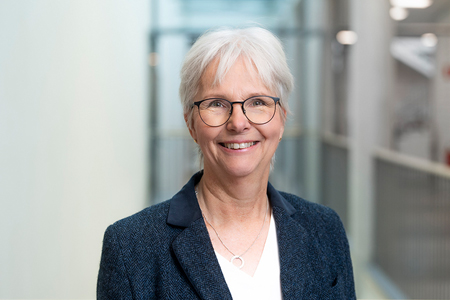Professor's portrait: Lena Wiklund Gustin

Lena Wiklund Gustin is one of the professors to be installed at the Academic Ceremony on 7 October 2022.
Lena Wiklund Gustin, Professor, School of Health, Care and Social Welfare, Division of Caring Sciences.
Please tell us briefly about your academic career – what decisions have brought you to where you are today?
I have always been driven by a desire to learn and understand more, to make a difference to the patients I meet. It was against this backdrop that I started my Master's degree in Health Sciences at Åbo Akademi University in 1990. There, I also discovered the joy of conducting research, but also of imparting knowledge to others to support them in their evidence based nursing. During my doctoral studies and the first years after publicly defending my thesis in 2000, I worked as a healthcare developer at the adult psychiatric clinic in Gävle and as an R&D supervisor at Gävleborg County Council's R&D centre. In 2004, I moved to Västerås and started working fulltime at MDH, where I was responsible for the specialist nursing education, specialising in psychiatric healthcare. An important decision has also been to not only focus on research but also prioritise my time to write study resource materials in order to convey health science knowledge to students, and in the long term contribute to excellent nursing.
In what area do you conduct research?
With my background as a nurse and psychotherapist in psychiatric healthcare, it has become obvious for me to conduct research on various aspects of nursing in conjunction with mental illness. Initially, my focus was on psychiatric nursing, but in recent years I have also engaged in research that concerns mental health and ill-health outside psychiatric care. I have also worked with method development in hermeneutics.
How would you describe your research environment at MDU?
I lead the research group "Care, Recovery and Health" together with Professor Margaretha Asp. Several lecturers who are interested in research are also active in this research team, where there is an ambition to develop scientific knowledge that can contribute to the research base, primarily in the nursing and specialist nursing educations. Collaboration takes place with clinical organisations where the group's research helps to develop the practice, and also with other disciplines in interdisciplinary projects.
What is the driving force in your research?
To develop knowledge that can make a difference, and to ensure that it is disseminated and benefits patients, carers and students. This also means that I strive to encourage staff and students to conduct research. In particular, the latter has implied that I have encouraged several students to write scientific articles based on their degree projects.
Which research domains are particularly important for you?
When I started my academic career, I worked as a nurse in psychiatric healthcare. Therefore, it was then inherent to focus my research on areas highly relevant to psychiatric nursing, and the focus was largely to understand the suffering person behind the diagnosis to be able to provide them with support. I passionately believe that developing knowledge which can contribute to alleviating suffering in conjunction with mental illness is vital. Simultaneously in recent years, I have also become increasingly interested in how people's mental health can be promoted and how mental illness can be prevented. Therefore, I believe self-care will be an important area in my future research.
How do you feel about becoming a Professor given that MDU has recently become an official University?
It is of course really stimulating to become a Professor at a time when research is becoming more crucial. I believe that it will create opportunities for us to contribute to the development of knowledge and thus society. At the same time, I think it’s important that we safeguard the strengths we had as a university college, and in future continue to invest in being at the forefront of our courses and study programmes.
What's the best part about conducting research at MDU?
I enjoy the great atmosphere, where we as researchers rejoice in one another's successes and give each other support to get ahead. I believe that a successful research and educational institution requires a climate where researchers and teachers can simultaneously be shining stars and part of a group, instead of competing for "stardom".
